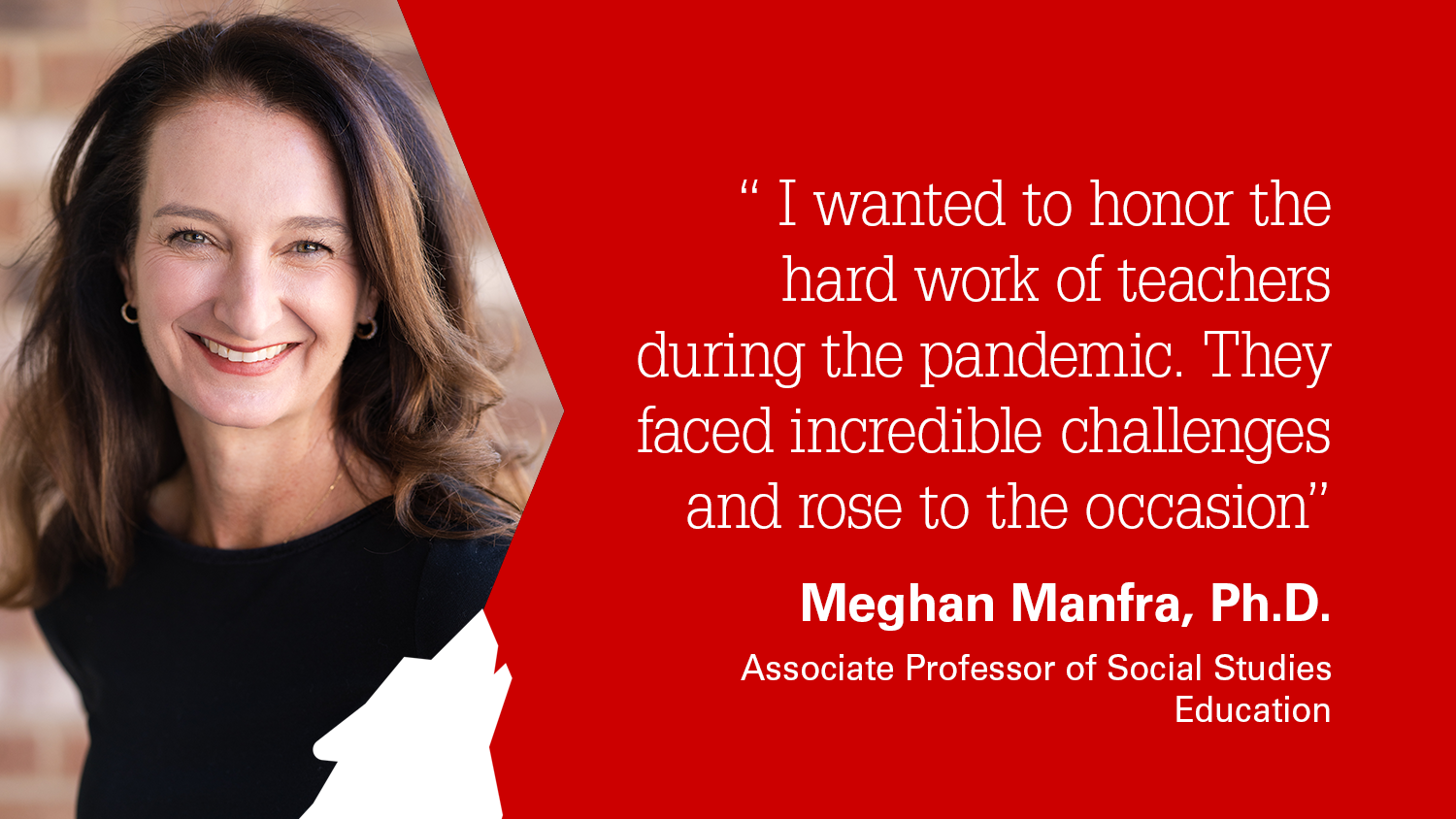Articles from Associate Professor Meghan Manfra Highlight Professional Development, Digital Instruction Challenges for Social Studies Teachers During the Pandemic

When NC State College of Education Associate Professor Meghan Manfra, Ph.D., and Associate Dean for Faculty and Academic Affairs John Lee, Ph.D., began working with social studies teachers in the Wake County Public School System (WCPSS), they never imagined their work would be laying an important foundation for support during the COVID-19 pandemic.
Manfra and Lee began providing professional development sessions focused on teaching inquiry using the College, Career and Civic Life (C3) Framework for the WCPSS’s 800 social studies teachers during the 2019-20 school year.
To further this work, Manfra used a $49,883 grant from the Spencer Foundation to work with eight social studies teachers who conducted collaborative action research about the inquiry design model of the C3 Framework and documented their experience and outcomes.
“These two projects laid an important foundation on which we were able to build on when the COVID-19 pandemic occurred,” Manfra said. “Specifically, we transitioned our professional learning programs to virtual spaces and continued to support teachers as they moved to online teaching. This led us to rethink the ways in which we support teachers, especially as we considered issues specific to teaching inquiry-based lessons in a digital environment.”
[spotlight-box label=”” img=”” heading=”Read More About the C3 Framework” cta=”Read More” url=”https://ced.ncsu.edu/news-new/news/2018/03/29/how-the-college-career-and-civic-life-framework-is-changing-social-studies-education/”]
Associate Dean for Faculty and Academic Affairs and Professor of Social Studies Education John Lee, Ph.D., was one of the main authors of the C3 Framework, which marries the common goals of succeeding in college life and a career with a third goal: being an engaged citizen. It has gained national attention and been implemented in instruction around the world since it was first published in 2013.
[/spotlight-box]
“Designing Inquiry During a Pandemic: A Professional Learning Experience,” authored by Manfra, Lee and WCPSS Secondary Social Studies Coordinating Teacher Meghan Grant and published in The Journal of Technology and Teacher Education, highlights the shift to virtual professional development sessions as well as early results from the project.
During the COVID-19 pandemic, Manfra and Lee created a professional learning platform to support more teachers in designing their own C3 inquiries using the Inquiry Design Model (IDM), a distinctive approach to creating curriculum and instructional materials that honors teachers’ knowledge and expertise. Teachers were provided with guidance via a website and email communication as they navigated five challenges based on the IDM Design Path.
The use of IDM, the paper asserts, helped to break down the design of a C3 inquiry into smaller, more concrete tasks which provided necessary scaffolding for teachers to develop their own C3 inquiries.
“Since everyone’s lives were disrupted by the pandemic, it was hard for teachers to find additional time to spend on professional development. We adjusted by making sure that the work we did with teachers was immediately practical — something they could put into place the next day — while also challenging them to consider ways to improve student learning outcomes through inquiry,” Manfra said.
Designing professional development during a pandemic had some unexpected benefits, as the online platform provided an opportunity to reach more teachers through flexible scheduling and asynchronous approaches, Manfra said. The ability for teachers to work at their own pace and work on issues directly related to their practice allowed Manfra and Lee to provide differentiated professional learning, which would have been more difficult during face-to-face sessions.
The digital platform is already showing promising results, the paper states, as early data suggests that the combination of scaffolding through the digital project combined with one-on-one communication with teachers provided the necessary support to help them navigate instructional shifts with inquiry-based instruction.
Early results from the research into teachers’ implementation of the C3 Framework in their instruction have shown that student learning outcomes improved over time and that teachers improved their pedagogical content knowledge in the process, the paper said.
“I hope to build on this work we have already done to provide teachers with ongoing support, including supporting efforts at the district level to develop teaching resources and curriculum materials,” said Manfra, who is currently working with Wake County schools to support a curriculum mapping initiative related to the new state standards in social studies.
Manfra’s research has long focused on the power of engaging teachers as collaborators and she believes it is important for researchers and teacher educators to consider teachers’ insider knowledge.
To that end, she recently published “Issues and Opportunities in the Digital Transformation of Social Studies Instruction” for Social Education, the journal of the National Council for the Social Studies. The article features anecdotes from six WCPSS teachers as they share the challenges they faced as they adapted to the new digital teaching environment while also addressing issues like the ongoing pandemic, the Jan. 6 insurrection at the U.S. Capitol and issues of racial disparity and police violence in their instruction.
“I wanted to honor the hard work of teachers during the pandemic,” Manfra said. “They faced incredible challenges and rose to the occasion. I find inspiration in their stories and I think others will too.”
In the article, teachers discuss how they found solutions to problems that included finding high-quality digital resources, negotiating logistical issues with online instruction, creating a digital classroom community and developing school-wide approaches to delivering a high-quality digital education.
By drawing attention to these common and complex challenges in digital education, Manfra said she hopes the field can move closer to improving online social studies instruction through the development of new strategies.
Her work with teachers in Wake County schools on this article and through the professional development work, she said, has been inherently rewarding as it allows research to meet practice and enables her to develop a better understanding of how to support teachers as learners.
Going forward, Manfra and Grant plan to build on this recent work by considering ways to scale up student learning, including a proposal to develop skills ladders for students in K-12 social studies.
- Categories:


